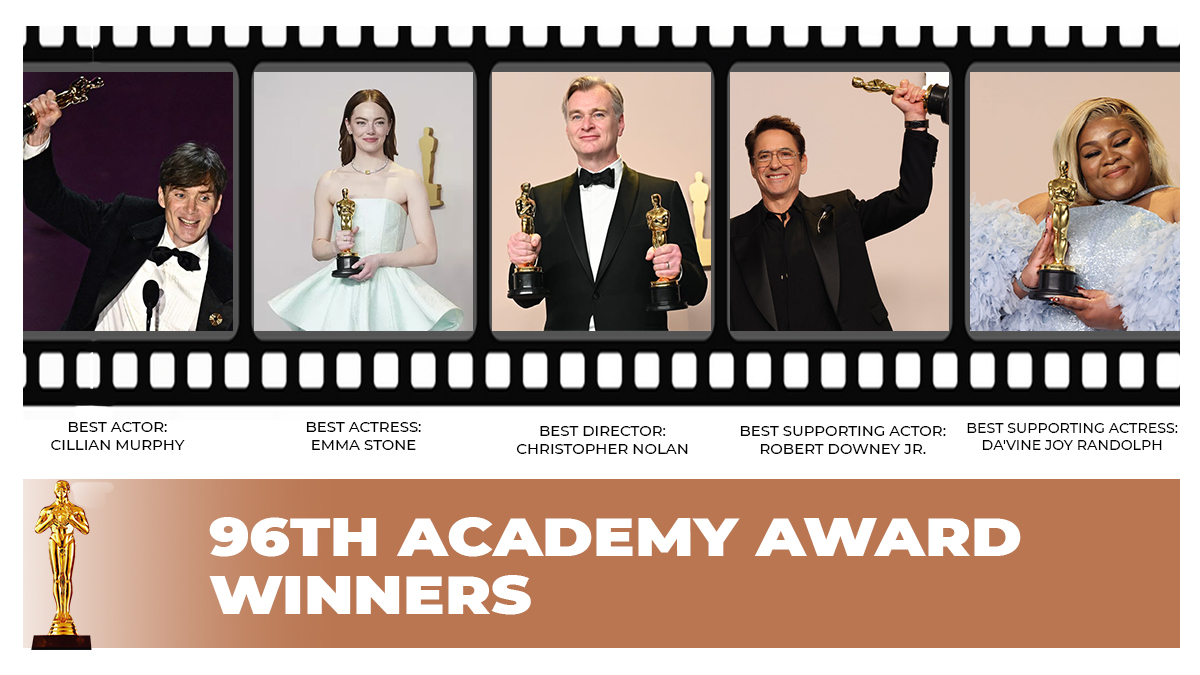Lights, camera, accolades! The glitz and glamour of the 96th Academy Awards brought Hollywood’s finest together to celebrate the outstanding achievements in filmmaking over the past year.
From gripping dramas to captivating performances, let’s delve into the triumphs and surprises that unfolded on Hollywood’s most prestigious night.
Table of Contents
Full list of winners from the 96th Academy Awards
Best Picture
Oppenheimer
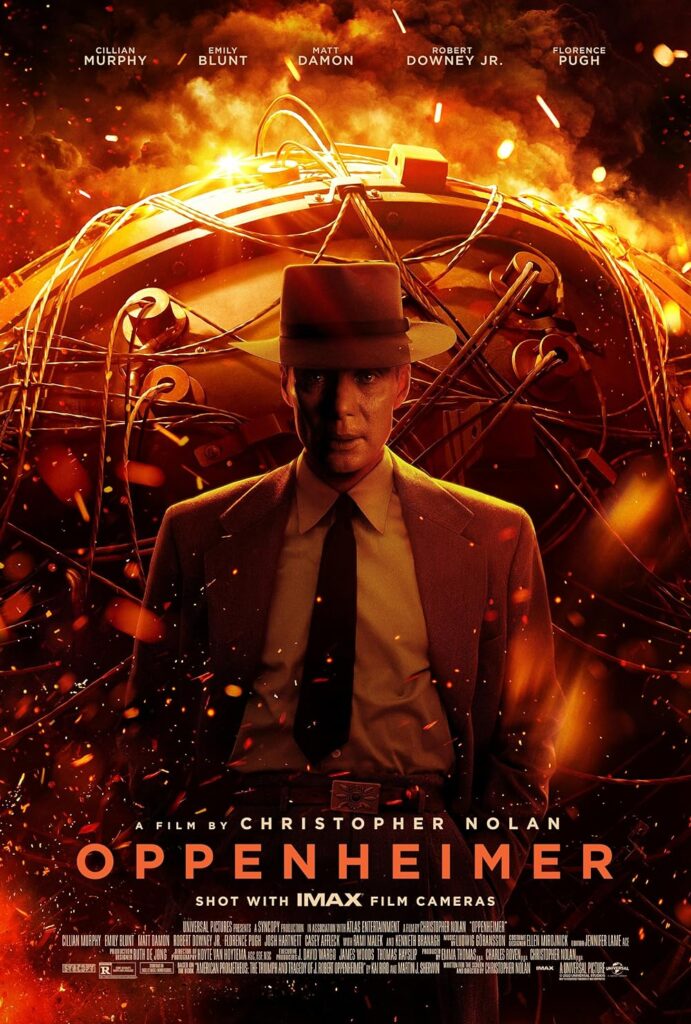
The biographical film based on the life of the American theoretical physicist J. Robert Oppenheimer, known commonly as the “father of the atomic bomb”.
Being nominated along the likes of the Scorsese-directed “Killers of the Flower Moon”, “Maestro”, etc., the movie managed to out-compete every other nomination.
Directed by Christopher Nolan, the film was nominated for 13 awards and ended up with 7 wins including Cillian Murphy as Best Actor for the titular role, Robert Downey Jr. for Lewis Strauss, and the best director: Nolan.
The movie was a critical and commercial success, grossing over $950 million globally.
Best Actor
Cillian Murphy
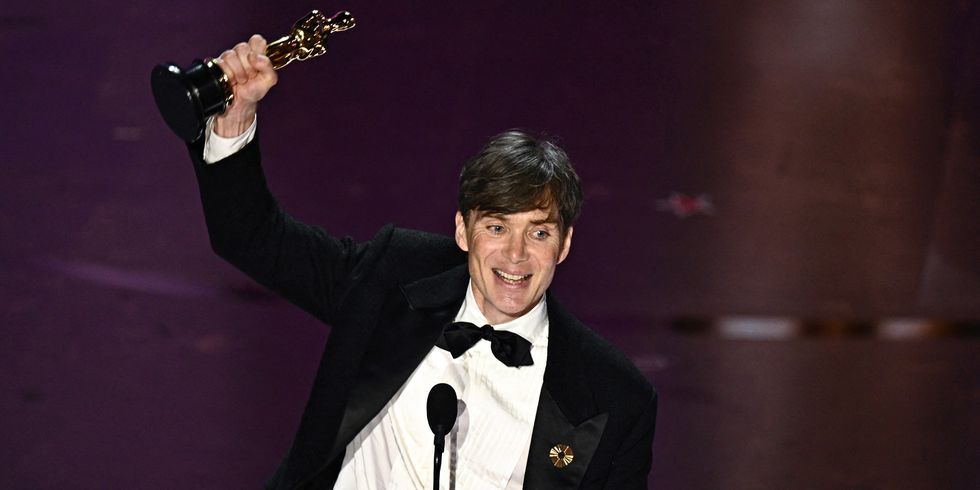
It was a significant moment in the actor’s career, as this performance got him his first nomination and win.
The Peaky Blinders actor known for his versatility and ability to immerse himself in a wide range of roles showcased his depth as an actor with his nuanced portrayal of J. Robert Oppenheimer, the “father of the atomic bomb”, the titular character of the film Oppenheimer.
Bringing to life the inner turmoil, brilliance, and moral dilemmas faced by Oppenheimer during a pivotal moment in history. His ability to convey emotions with subtlety and authenticity resonated with viewers, earning him critical acclaim and ultimately the prestigious Oscar for Best Actor.
This win highlights Murphy’s talent and reflects the collaborative effort and creative vision of the entire team behind “Oppenheimer,” including director Christopher Nolan.
In his acceptance speech, Murphy expressed gratitude to Nolan, Emma Thomas, and the Academy, and dedicated his win to the peacemakers worldwide, acknowledging the impact of Oppenheimer’s legacy on our world today.
Best Actress
Emma Stone
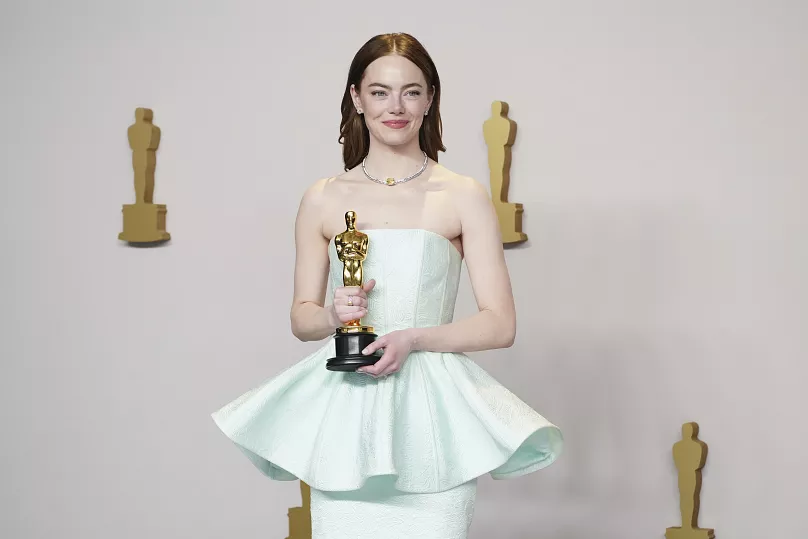
Winning previously for the role of Mia Dolan in the 2016 film La La Land, Emma Stone won the award a second time for the role of Bella Baxter in “Poor Things”, a film directed by Yorgos Lanthimos and based on a novel by Alasdair Gray.
Stone’s portrayal of Bella, a character with a child’s brain implanted into an adult body showcased intense physicality, intellectual acuity, and emotional depth, earning her critical acclaim and recognition from the industry.
In her speech, Stone expressed admiration for her fellow nominees and emphasized the collaborative effort that goes into making a film. She highlighted the importance of teamwork and acknowledged the dedication and brilliance of everyone involved in creating “Poor Things”.
Best International Feature Film
The Zone of Interest
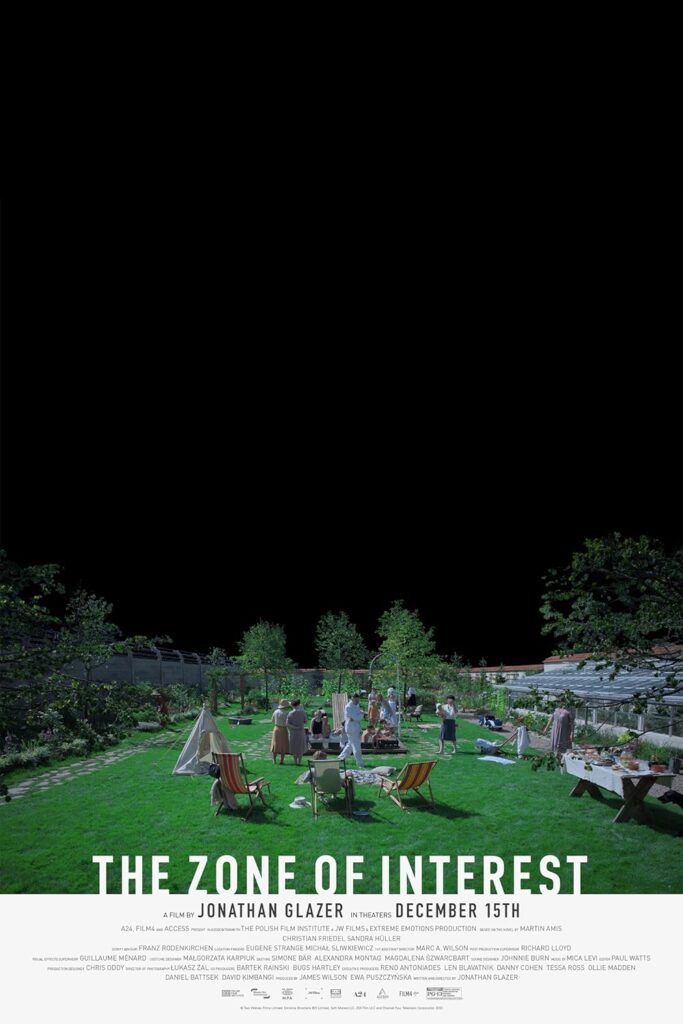
Directed by Jonathan Glazer, a holocaust drama starring Christian Friedel and Sandra Hüller and explores the lives of a Nazi family living near the Auschwitz death camp during World War II.
Glazer’s approach to depicting the horrors of Nazism without showing explicit violence but relying on sound design to convey the horror was praised by critics and audiences alike.
The movie’s focus on the capacity for violence in all people and its relevance to current conflicts in the world added depth and significance to its narrative.
“The Zone of Interest” also received nominations for Best Picture and Best Director at the Oscars, further solidifying its impact and recognition in the film industry, and making this the first win for the director Glazer.
Best Supporting Actress
Da’Vine Joy Randolph
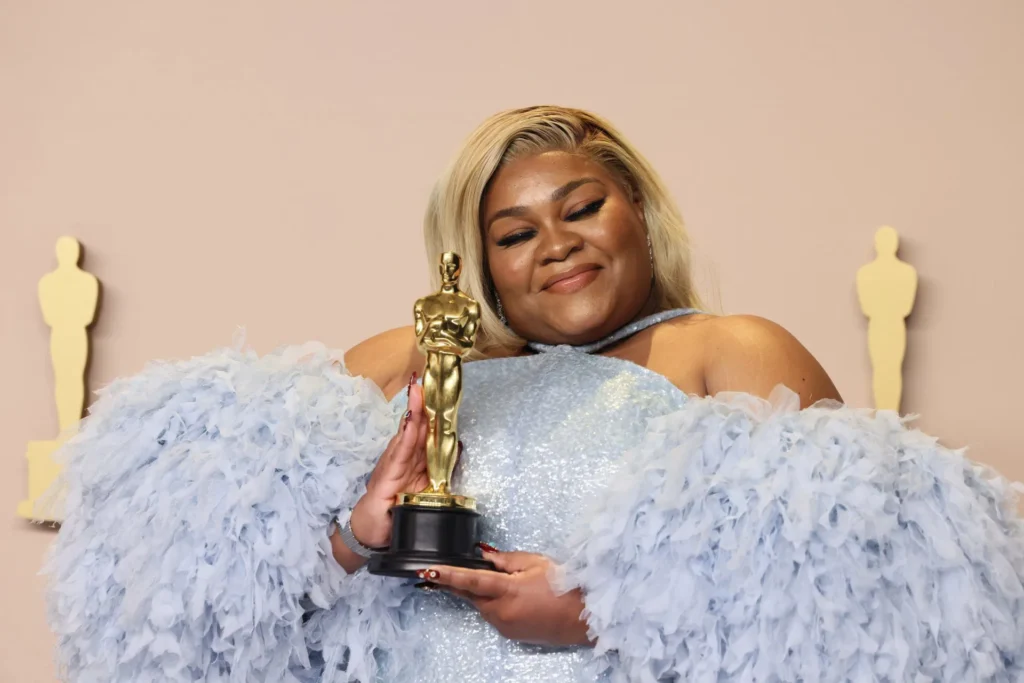
Randolph’s performance in “The Holdovers”, portraying the character of Mary Lamb, a grieving head cook at a New England boarding school, with depth and authenticity captivated audiences and marked her first Oscar victory ever.
Randolph’s win was presented by past Best Supporting Actress Oscar winners like Jamie Lee Curtis, Lupita Nyong’o, Rita Moreno, Regina King, and Mary Steenburgen. Each presenter delivered a moving speech about one of the current nominees before Randolph was announced as the winner.
The film “The Holdovers,” in which Randolph stars alongside Paul Giamatti, received critical acclaim for its exploration of friendship in unlikely places and its powerful storytelling that resonated with audiences.
In her speech, Randolph reflected on her journey, stating, “I didn’t think I was supposed to be doing this as a career.” She shared how she started as a singer and credited her mother for encouraging her to explore the theater department, where she found her calling.
Best Supporting Actor
Robert Downey Jr.
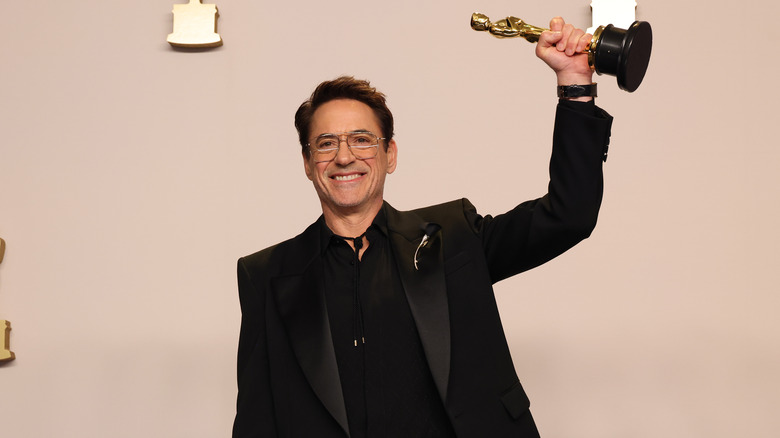
Who doesn’t love a comeback story?
After a life of struggle dealing with a traumatic childhood and substance abuse issues that haunted his adult life, the man turned his life around with his portrayal of Tony Stark, in the Marvel Cinematic Universe, a role many believe he was born to play.
Rising to intense popularity, he showcased his versatile acting skills throughout various roles, reaching its culmination when he portrayed Rear Adm. Lewis Strauss in the critically acclaimed “Oppenheimer”. The role earned him his first-ever Oscar victory.
Downey, humorously thanked his “terrible childhood” and the Academy in that order, setting a light-hearted tone for his speech. He expressed his appreciation for his wife, Susan Downey, whom he humorously referred to as his veterinarian, stating that she found him as a “snarling rescue pet” and loved him back to life, which he humorously credited as the reason he was standing on the Oscar stage.
Downey’s speech also touched on the significance of the role in “Oppenheimer,” acknowledging that he needed the job more than it needed him.
He highlighted the meaningful nature of their work as actors and filmmakers, emphasizing the importance of the stories they choose to tell. Additionally, he thanked his publicist, agent, stylist, and entertainment lawyer for their support throughout his career, recognizing the team effort behind his success.
Best Original Song
What Was I Made For? [From The Motion Picture “Barbie”]
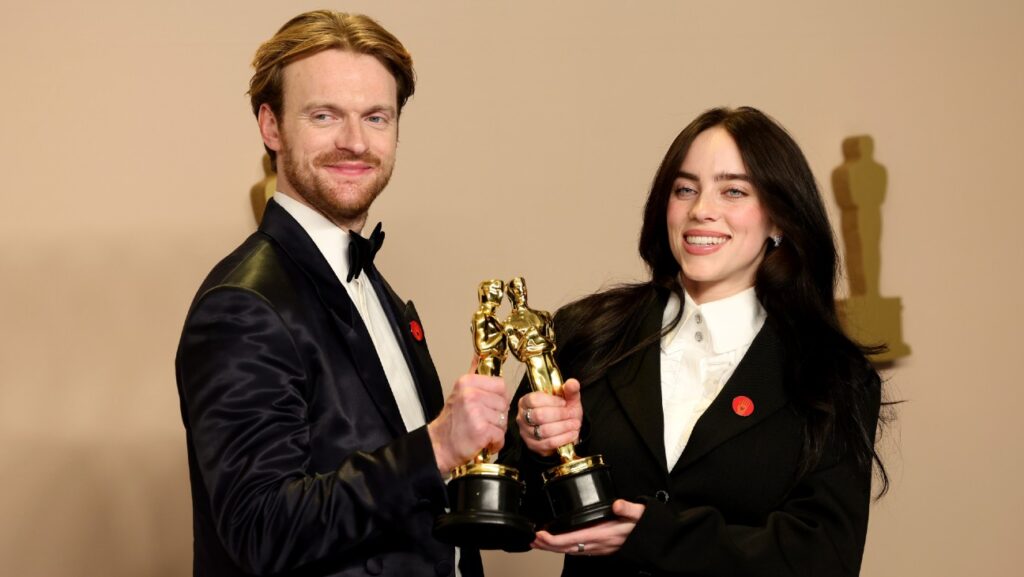
“What Was I Made For?” from the motion picture “Barbie” secured the prestigious Best Original Song award at the 2024 Academy Awards.
The song written by siblings Billie Eilish and FINNEAS, captivated audiences with its poignant lyrics and evocative composition, showcasing the duo’s exceptional musical talent and ability to evoke deep emotions through their work.
During her acceptance speech, Billie Eilish expressed surprise and gratitude for the award, revealing that she had a nightmare about it the night before. She dedicated the award to everyone impacted by “Barbie” and expressed appreciation for the movie’s impact on audiences. Eilish thanked director Greta Gerwig for her contribution to the film and song, acknowledging the collaborative effort that brought “What Was I Made For?” to life.
Additionally, she expressed gratitude to her best friend Zoe for childhood memories of playing Barbies together, her dance and choir teachers for their support, and her parents for their unwavering love.
Best Director
Christopher Nolan
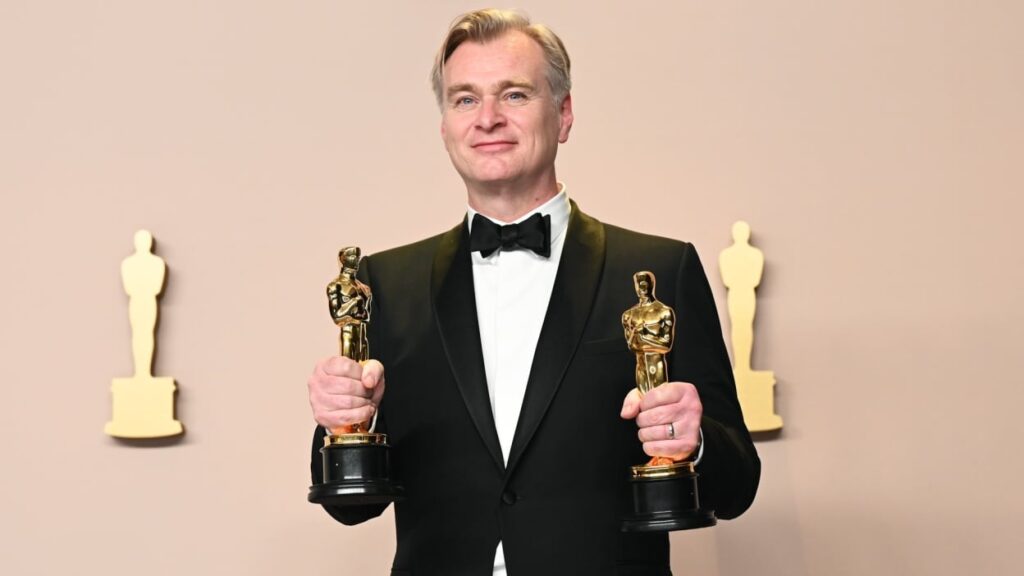
Having a career full of outstanding movies and previous nominations like “Dunkirk”, “Inception”, and “Memento”, the acclaimed filmmaker got his first Oscar victory as the best director for the critically acclaimed film “Oppenheimer”.
He expressed his gratitude during his acceptance speech, acknowledging the incredible cast and crew that contributed to the film. Nolan thanked key individuals such as Matt Damon, Robert Downey Jr., Emily Blunt, Florence Pugh, and Cillian Murphy for their exceptional performances, as well as producer Emma Thomas for her unwavering support.
Nolan’s acceptance speech reflected on the significance of movies in the context of their relatively short history, emphasizing the impact of cinema on culture and society. He humbly accepted the recognition from the Academy, acknowledging the honor of being considered a meaningful part of this cinematic journey. This win not only celebrated Nolan’s achievement but also recognized the collaborative effort and dedication of everyone involved in bringing “Oppenheimer” to life and ultimately winning 7 Academy awards.
Best Animated Feature Film
The Boy and The Heron

The “Spirited Away” director got his second Oscar win for “The Boy and the Heron”, making him the oldest director to receive this award at the age of 83.
The film, a semi-autobiographical fantasy piece, follows a boy who moves to the countryside after his mother’s death during World War II and embarks on a mysterious journey guided by a talking grey heron. Miyazaki’s inspiration for the film stemmed from a Yoshino Genzaburo novel that deeply influenced him in his childhood.
“The Boy and the Heron” captivated audiences with its blend of character drama and fantastical elements, resonating with viewers on a profound level. The movie’s success extended beyond the Oscars, as it also won a Golden Globe Award in the United States and became the first Japanese film to win a British Academy Film Award. Miyazaki’s decision to come out of retirement to create this film surprised the animation world, showcasing his enduring passion for storytelling and filmmaking.
Despite Miyazaki and producer Toshio Suzuki not being present at the ceremony to accept the award, Studio Ghibli COO Kiyofumi Nakajima expressed gratitude for the recognition and highlighted the challenges faced during the film’s production. Nakajima emphasized the significance of overcoming these difficulties to create a work that resonated with audiences worldwide.
Best Live-Action Short Film
The Wonderful Story of Henry Sugar
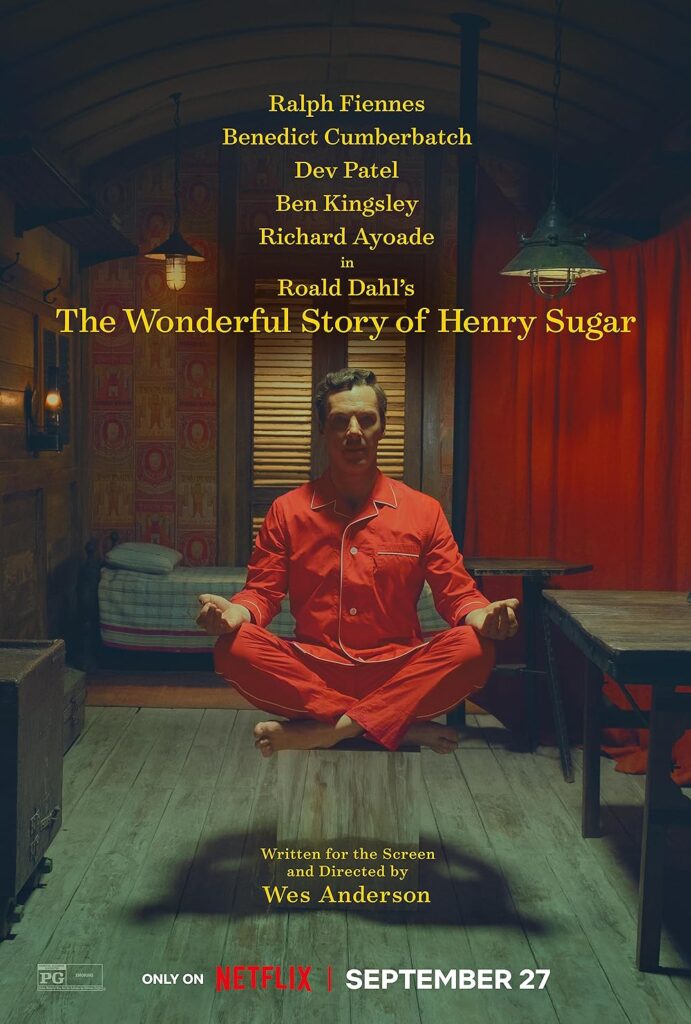
“The Wonderful Story of Henry Sugar,” a 39-minute adaptation of Roald Dahl’s story, won the Academy Award for Best Live Action Short Film at the 2024 Oscars. Directed by Wes Anderson, this film marked Anderson’s first-ever Oscar win after being nominated eight times over the years. The movie triumphed over other nominees like “The After,” “Invincible,” “Knight of Fortune,” and “Red, White and Blue.” Anderson’s adaptation of Dahl’s story was praised for its creativity and visual inventiveness, showcasing his talent as a filmmaker.
Despite Wes Anderson not being present to accept the award in person, his achievement with “The Wonderful Story of Henry Sugar” was a significant moment in his career. This win highlighted Anderson’s versatility as a director, known for his unique storytelling style and attention to detail in his films. The success of this short film added to Anderson’s impressive body of work, which includes acclaimed movies like “The Grand Budapest Hotel,” “Moonrise Kingdom,” and “Fantastic Mr. Fox”.
Best Documentary Feature
20 Days in Mariupol
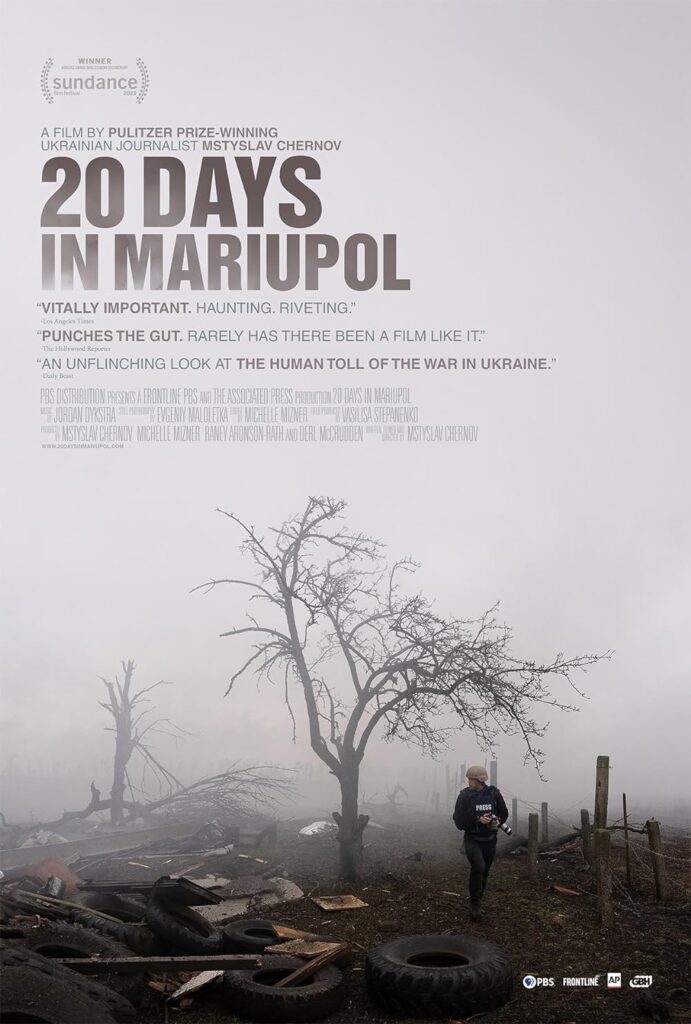
Directed by Mstyslav Chernov, “20 Days in Mariupol” won the Academy Award for Best Documentary Feature at the 2024 Oscars. This powerful documentary provides a first-person account of the early days of Russia’s invasion of Ukraine, focusing on the harrowing siege of the Ukrainian port city of Mariupol. The film captures the devastation and human cost of the conflict, showcasing the bravery and resilience of the Ukrainian people in the face of tragedy.
During his acceptance speech, Mstyslav Chernov made a poignant statement in support of Ukraine, expressing his wish that he had never had to make the film and calling for an end to the violence and aggression. He emphasized the importance of setting the historical record straight and ensuring that the truth prevails, highlighting how cinema forms memories that shape history. Chernov’s emotional speech resonated with the audience, drawing attention to the ongoing crisis in Ukraine and honoring those who have sacrificed their lives.
“20 Days in Mariupol” not only received critical acclaim but also won other prestigious awards like a Pulitzer Prize, further underscoring its impact and significance in shedding light on the realities of war and conflict. The documentary’s recognition at the Oscars highlighted its role in raising awareness about the situation in Ukraine and honoring those affected by the tragic events depicted in the film.
Best Visual Effects
Godzilla Minus One

“Godzilla Minus One” made history by winning the Academy Award for Best Visual Effects at the 2024 Oscars. Directed by Takashi Yamazaki, this Japanese film became the first in the Godzilla franchise to win an Oscar, marking a significant achievement for the movie and its creators.
The film’s visual effects team, including Kiyoko Shibuya, Masaki Takahashi, and Tatsuji Nojima, contributed to this groundbreaking win. Notably, director Takashi Yamazaki also became Japan’s first-ever winner of the Best Visual Effects Oscar, a remarkable feat that highlighted the film’s impact on the international stage
Best Adapted Screenplay
American Fiction
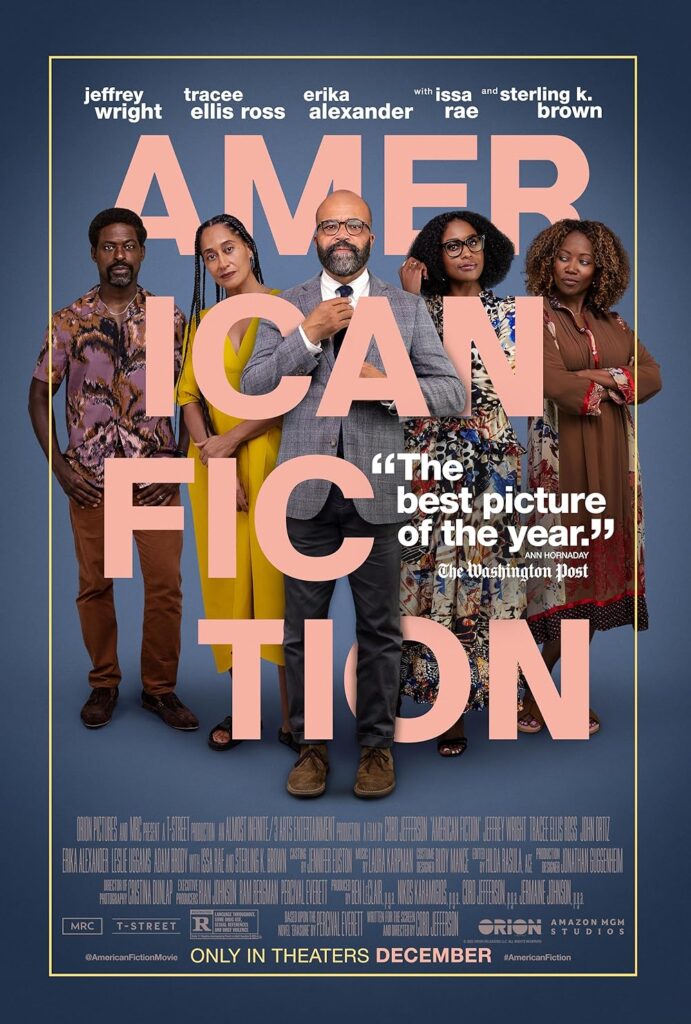
“American Fiction” made a significant impact at the 2024 Oscars by winning the Academy Award for Best Adapted Screenplay. Directed by Cord Jefferson, this film, based on Percival Everett’s novel “Erasure,” follows the story of Thelonious “Monk” Ellison, a frustrated author who parodies stereotypical Black literature under a pseudonym, leading to unexpected success and personal challenges.
Jefferson’s feature film debut triumphed over predicted front runners like “Oppenheimer,” “Barbie,” and “Poor Things,” showcasing his talent and vision as a filmmaker.
During his acceptance speech, Cord Jefferson expressed gratitude for the recognition and emphasized the importance of providing opportunities to new creatives in the industry. He called for Hollywood to take chances on small-budget films and emerging talents, highlighting the transformative power of filmmaking and storytelling. Jefferson’s win for “American Fiction” not only celebrated his achievement but also shed light on the need for diversity and inclusivity in the film industry.
Best Documentary (Short Subject)
The Last Repair Shop
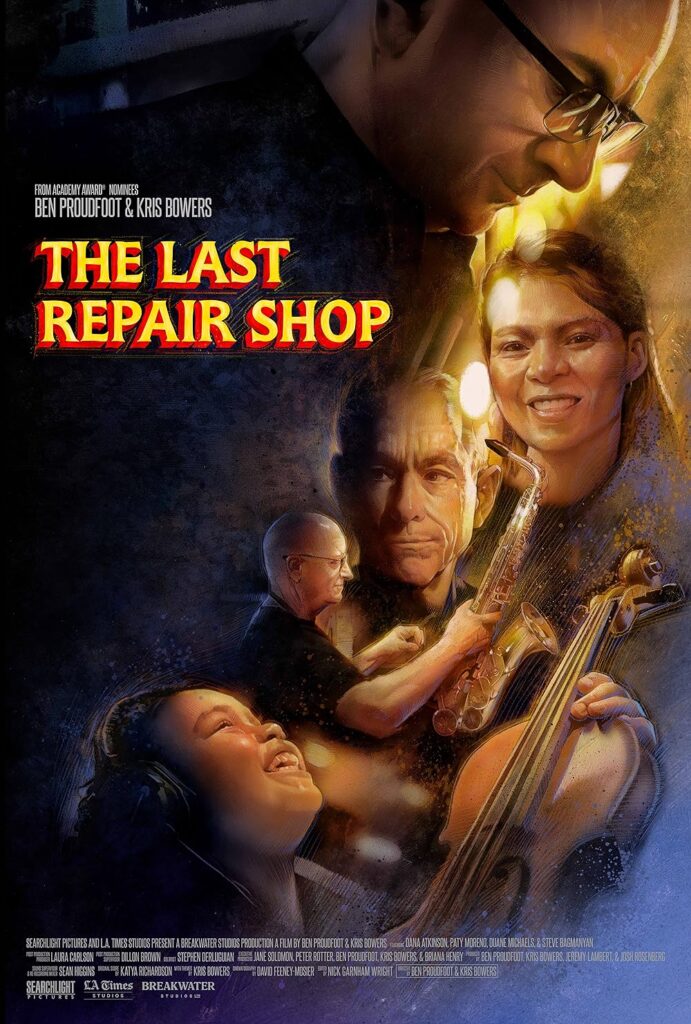
Directed by Kris Bowers and Ben Proudfoot, “The Last Repair Shop” won the Academy Award for Best Documentary Short Film at the 96th Academy Awards.
The documentary tells the story of the dedicated craftsmen in Los Angeles who maintain and repair musical instruments for the city’s public school system. It sheds light on the unsung heroes who ensure that students have access to free instruments, highlighting the importance of music education and the impact it has on young individuals. The win at the Oscars recognized the film’s powerful storytelling and its celebration of those who work behind the scenes to keep music alive in schools.
Best Original Screenplay
Anatomy of a Fall
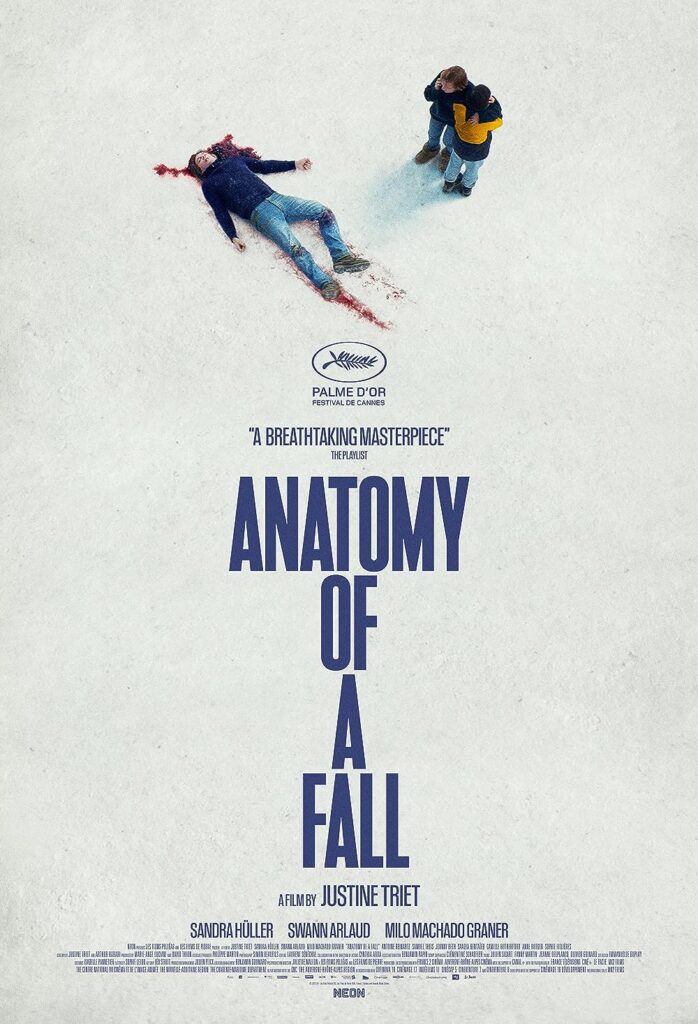
Being a Best Picture nominee, the French legal drama directed by Justine Triet, who co-wrote the screenplay with Arthur Harari, won the Academy Award for Best Original Screenplay.
The film depicts the story of a woman accused of killing her husband, portrayed by Sandra Hüller, skillfully merging a battle of the sexes with a courtroom thriller, captivating audiences with its compelling narrative and stellar performances. Triet and Harari’s devilishly clever script resonated with viewers and critics alike, earning them this prestigious award.
During their acceptance speech, Justine Triet and Arthur Harari expressed gratitude for the recognition and highlighted the challenges they faced while writing the film. Triet humorously mentioned how the glamour of the evening contrasted with their experience during lockdown, stuck at home with two kids hooked up to cartoons for peace. She emphasized the blurred line between work and personal life during that time, showcasing the dedication and perseverance that went into creating “Anatomy of a Fall”.
The film’s success extended beyond the Oscars, as it was also nominated for four other awards, including Best Picture and Best Director. Sandra Hüller’s performance as the accused wife garnered praise for its depth and emotional resonance, adding to the film’s impact on audiences. “Anatomy of a Fall” stood out for its intricate storytelling, powerful character dynamics, and thought-provoking themes, solidifying its place as a standout piece of cinema in 2024.
Best Animated Short Film
War Is Over! Inspired by the Music of John and Yoko 2023

“War is Over! Inspired by the Music of John and Yoko” made a significant impact at the 96th Academy Awards by winning the award for Best Animated Short Film.
Directed by Dave Mullins and produced by Brad Booker, this 11-minute animated film is set in an alternate World War I reality where two soldiers on opposite sides of the conflict engage in a game of chess via messages delivered by a heroic carrier pigeon. As the war and the game escalate, the film delivers a powerful anti-war message, emphasizing that there are no winners in war.
During their acceptance speech, Dave Mullins and Brad Booker expressed their gratitude for the award and highlighted the inspiration they drew from John Lennon and Yoko Ono’s peace anthem “Happy Xmas (War Is Over).”
They emphasized the importance of honoring the anti-war message in their film and thanked their team at Electro League for their hard work and dedication. Thomas Newman’s incredible score for the film was also acknowledged, along with the support from their families and collaborators like Peter Jackson, WetaFX, Lightstorm Entertainment, and Epic Games.”War is Over! Inspired by the Music of John and Yoko” stands out not only for its poignant storytelling but also for its visual effects created by WetaFX and its use of Unreal Engine from Epic Games in production. The film’s win at the Oscars underscored its impact in conveying a powerful message about the futility of war through animation.
Best Original Score
Oppenheimer
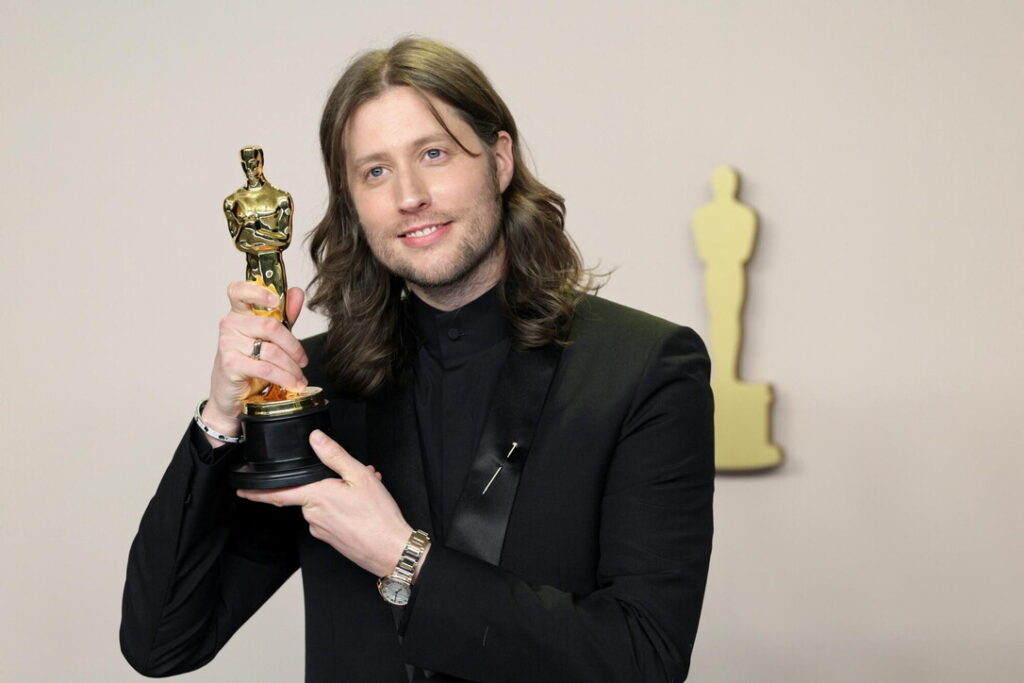
“Oppenheimer” won the Academy Award for Best Original Score at the 2024 Oscars, with Ludwig Göransson receiving this prestigious accolade.
Göransson’s exceptional work on the film’s score, under the direction of Christopher Nolan, captivated audiences and critics alike. The score, which prominently featured the violin, was a key element in setting the tone for the film and enhancing its emotional impact.
During his acceptance speech, Ludwig Göransson expressed gratitude to Christopher Nolan for inviting him to score the film and for suggesting the use of the violin in the score. This decision allowed Göransson to collaborate with his wife, acclaimed violinist Serena Göransson, resulting in a beautiful and evocative musical composition. Göransson also thanked his parents for fostering his musical talents by providing him with guitars and drum machines instead of video games during his upbringing.
Göransson’s win for “Oppenheimer” marked his second Oscar in the Best Original Score category, adding to his impressive list of accolades that include Grammy Awards and a previous Oscar for his work on “Black Panther.” The composer’s meticulous approach to creating over three hours of music for “Oppenheimer,” including a haunting violin theme and synthesizers to convey impending doom, showcased his talent and dedication to his craft.
Best Cinematography
Oppenheimer

Oppenheimer secured the Academy Award for Best Cinematography at the 96th Academy Awards, with Hoyte Van Hoytema receiving this prestigious recognition.
The film, directed by Christopher Nolan, captivated audiences with its visual storytelling and stunning cinematography. Hoytema’s work on “Oppenheimer” played a crucial role in creating the film’s immersive and visually striking atmosphere, enhancing the narrative and emotional depth of the story.
During the awards ceremony, Hoyte Van Hoytema expressed gratitude for the opportunity to work on “Oppenheimer” and collaborate with Christopher Nolan to bring this historical drama to life. The cinematographer’s exceptional talent in capturing the essence of each scene through lighting, framing, and composition contributed significantly to the film’s success. His ability to visually translate the complexities of J. Robert Oppenheimer’s story onto the screen was pivotal in earning him this accolade.
Best Makeup and Hairstyling
Poor Things
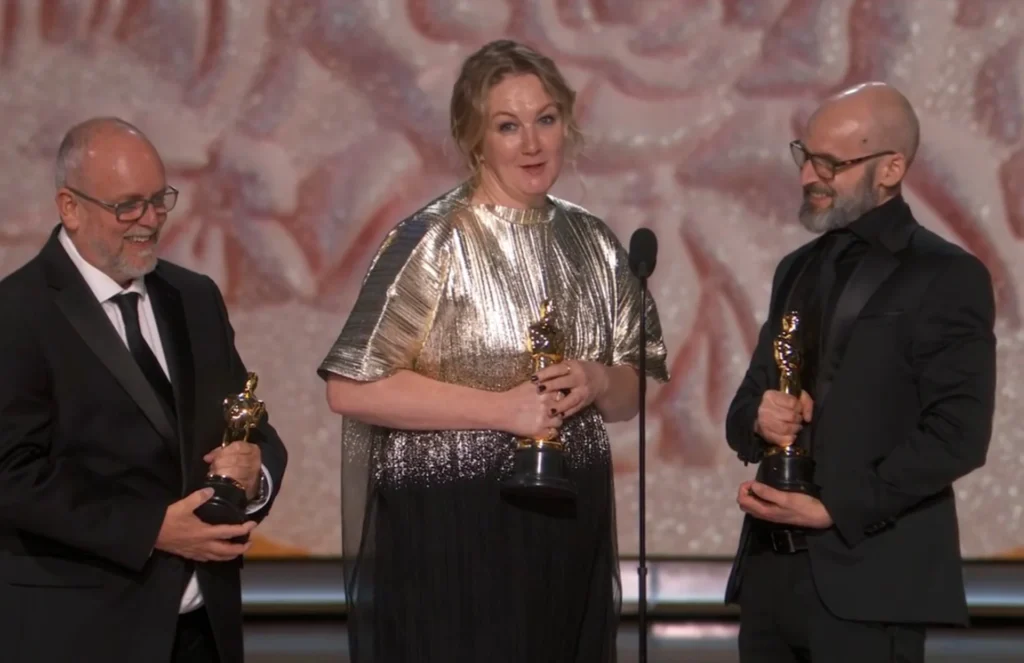
“Poor Things” made a remarkable impact at the 96th Academy Awards by winning the award for Best Makeup and Hairstyling.
The talented team behind the film, including Nadia Stacey, Mark Coulier, and Josh Weston, received this prestigious award for their exceptional work in transforming the actors and bringing the characters to life on screen.
The film’s makeup and hairstyling played a crucial role in enhancing the storytelling and visual appeal of “Poor Things.” During the awards ceremony, the winners expressed their gratitude for the recognition and highlighted the creative process behind the makeup and hairstyling in “Poor Things.” Their dedication to detail and artistry contributed significantly to the film’s success, showcasing their talent and expertise in the field of makeup and hairstyling for cinema.
“Poor Things” also received early Oscar wins for Best Production Design and Costume Design, further solidifying its position as a standout film at the 96th Academy Awards. Directed by Yorgos Lanthimos and starring Emma Stone, the absurdist comedy garnered praise for its unique visual style and attention to detail in various aspects of production design, makeup, hairstyling, and costume design.
Best Costume Design
Poor Things
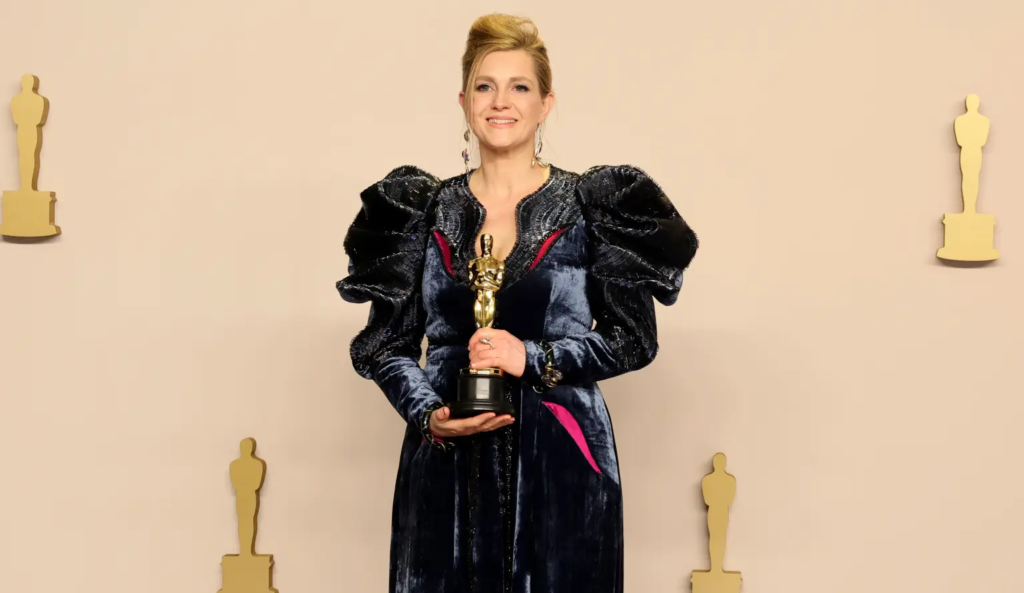
“Poor Things” achieved a remarkable feat at the 96th Academy Awards by winning the award for Best Costume Design.
Holly Waddington, the talented costume designer behind the film, received this prestigious accolade for her exceptional work in creating captivating and character-defining costumes for the movie. Waddington’s creativity and attention to detail played a pivotal role in enhancing the visual appeal and authenticity of the characters in “Poor Things.”
During her acceptance speech, Holly Waddington expressed her gratitude for the award and thanked the Academy for the honor. She acknowledged the rare opportunity she had with “Poor Things” to be free and artistic in her creative process as a costume designer. Waddington highlighted the collaborative nature of filmmaking, thanking the cast for their dedication and willingness to bring her costume designs to life on screen. She specifically mentioned Emma Stone for embodying her character, Bella, with grace and authenticity.
Waddington also extended her appreciation to her costume team, emphasizing the challenges they faced during production, including working in Budapest amidst the pandemic with a diverse team of professionals. Despite these obstacles, their collective effort and commitment resulted in stunning costumes that contributed significantly to the film’s overall aesthetic and storytelling.
Best Production Design
Poor Things
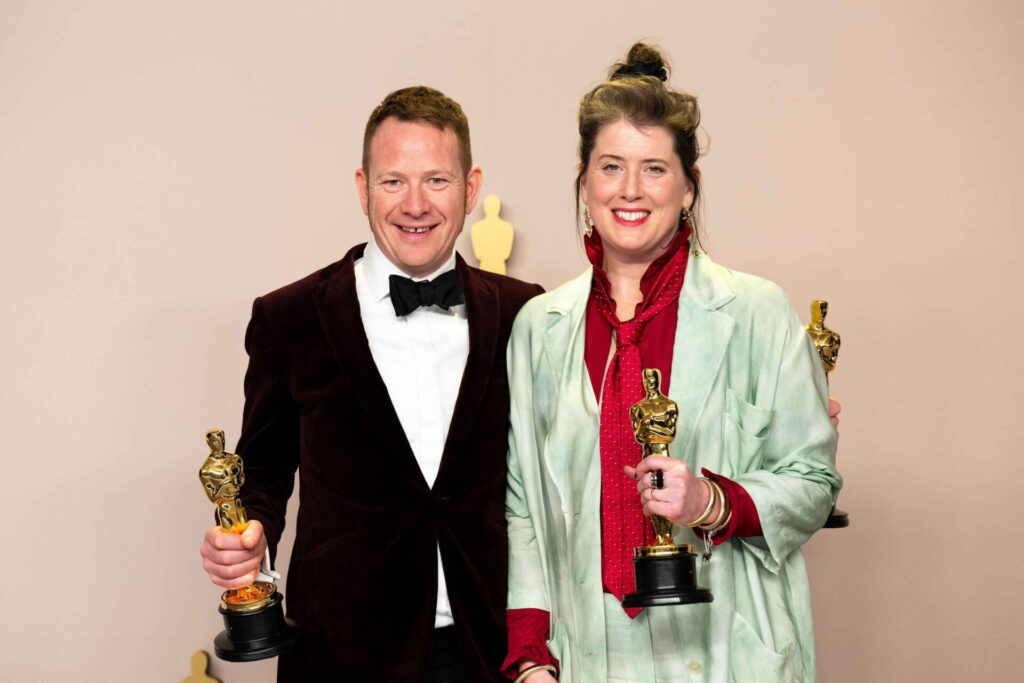
Poor Things won the Academy Award for Best Production Design at the 96th Academy Awards. The production design team, led by James Price and Shona Heath, along with set decorator Zsuzsa Mihalek, received this prestigious accolade for their outstanding work on the film. Their creativity and attention to detail in creating the visual world of “Poor Things” played a crucial role in immersing audiences in the film’s narrative and enhancing the overall cinematic experience.
The team behind the production design of “Poor Things” surpassed strong competition from other notable films like “Oppenheimer,” “Barbie,” “Killers of the Flower Moon,” and “Napoleon.” Their exceptional craftsmanship and artistic vision brought to life the unique settings and atmospheres required for the film’s storytelling, contributing significantly to its success and impact on viewers.
Best Film Editing
Oppenheimer
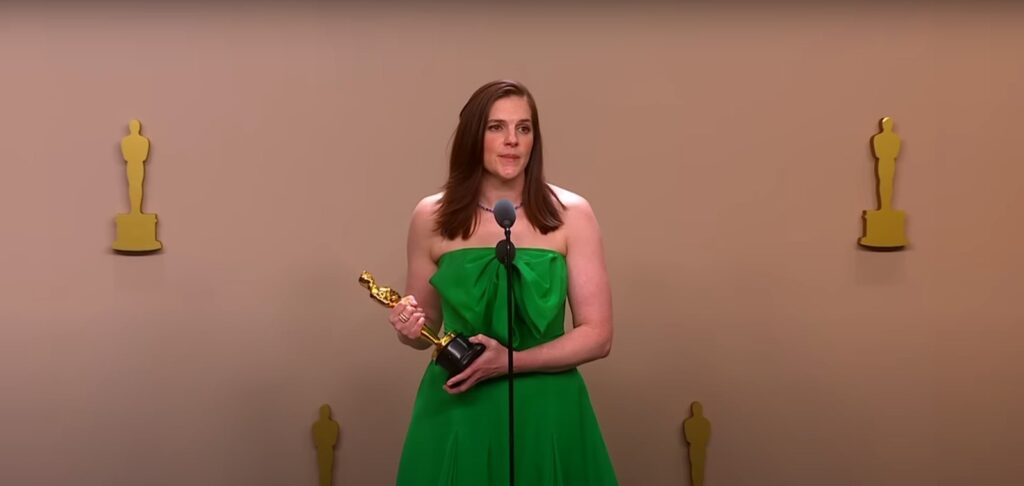
“Oppenheimer” secured the Academy Award for Best Film Editing at the 96th Academy Awards, with Jennifer Lame receiving this prestigious accolade for her exceptional work on the film. Lame’s editing skills played a pivotal role in shaping the narrative, pacing, and overall cinematic experience of Oppenheimer. Her meticulous approach to editing scenes, creating seamless transitions, and enhancing the storytelling contributed significantly to the film’s success and critical acclaim.
During the awards ceremony, Jennifer Lame expressed gratitude for the recognition and thanked Christopher Nolan for entrusting her with the editing of “Oppenheimer.” She highlighted the collaborative nature of filmmaking and emphasized the challenges and rewards of working on such a complex and impactful project. Lame’s expertise in crafting a cohesive and engaging narrative through her editing work was instrumental in elevating the film to new heights.
“Oppenheimer” emerged as a dominant force at the Oscars by winning a total of seven awards, including Best Picture, Best Director (Christopher Nolan), Best Actor (Cillian Murphy), Best Supporting Actor (Robert Downey Jr.), Best Cinematography (Hoyte Van Hoytema), Best Film Editing (Jennifer Lame), and Best Original Score (Ludwig Göransson). This remarkable achievement underscored the film’s overall excellence and the outstanding contributions of its cast and crew in delivering a compelling cinematic experience.
Best Sound
The Zone of Interest
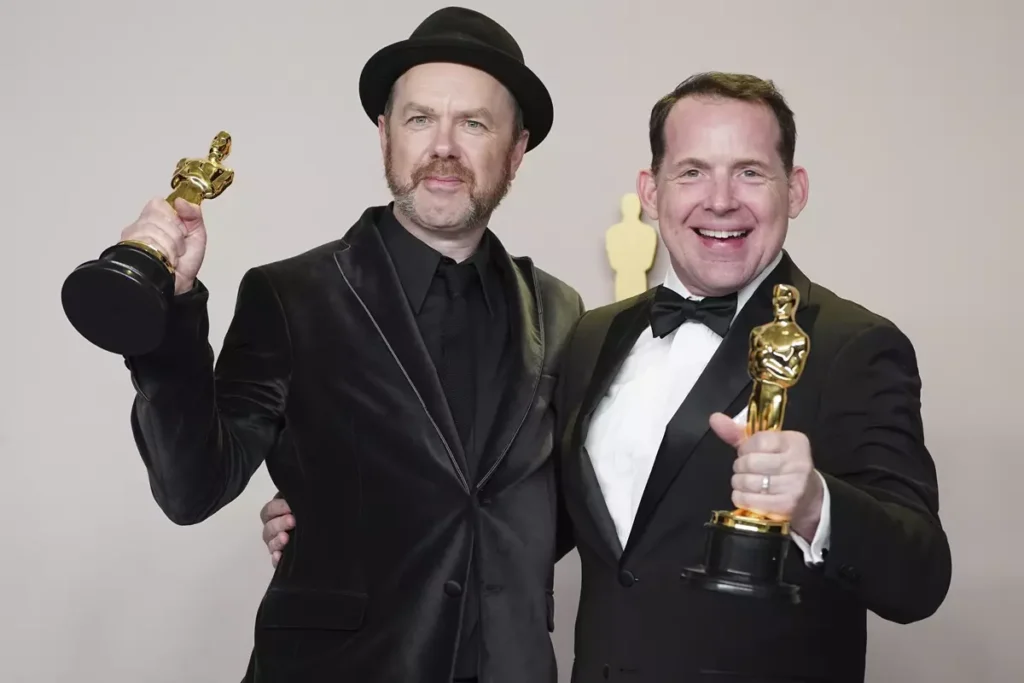
“The Zone of Interest” achieved a significant milestone at the 96th Academy Awards by winning the Academy Award for Best Sound.
This recognition highlighted the exceptional sound design in the film, directed by Jonathan Glazer, which delves into the haunting realities of the Holocaust through a unique narrative approach.
The sound designers, Johnnie Burn and Tarn Willers played a pivotal role in creating an immersive auditory experience that intensified the emotional impact of the movie. The sound design in “The Zone of Interest” was lauded for its ability to convey the malevolence of Nazism without explicitly depicting the horrors of the Holocaust visually. By immersing audiences in a world where dehumanization leads to unimaginable atrocities, the sound designers effectively communicated the weight of historical events and their relevance to contemporary issues. The meticulous attention to detail in capturing sounds, from growled orders to shrieks of pain, crackles of gunfire, and cries of children, added layers of authenticity and emotional depth to the film.
Johnnie Burn, as the lead sound designer, conducted extensive research to authentically capture the sounds of Auschwitz. This involved consulting archives from the Auschwitz Memorial Museum, witness testimonies, and historical records to ensure accuracy and credibility in portraying the auditory landscape of the concentration camp. Burn’s dedication to authenticity and restraint in sound portrayal was crucial in balancing the need to convey historical truths without sensationalizing or overwhelming audiences with graphic details.
The sound design team’s innovative approach involved creating two parallel films within “The Zone of Interest” – one that viewers see and another that they hear. This dual narrative structure allowed for a nuanced exploration of domestic life juxtaposed with the grim realities beyond the walls of Auschwitz. The strategic placement of sounds, such as dogs barking, gunshots in the distance, bone-chilling screams, and the constant churning sound of the crematorium, added depth and complexity to the auditory experience.
Overall, the film stood out for its exceptional sound design that skillfully captured the essence of the film’s narrative and heightened its impact on audiences. The award for Best Sound at the Oscars recognized the outstanding work of Johnnie Burn and Tarn Willers in crafting a haunting auditory landscape that resonated deeply with viewers.
Conclusion
As the 96th Academy Awards come to an end, we’re left with memories of all the glitz and glamour from Hollywood’s big night. From amazing performances to great stories, this year’s Oscars showed us the best of the movie world. “Oppenheimer” was a big winner, taking home seven awards, including Best Picture and Best Director for Christopher Nolan.
There were also some surprises and happy moments like Emma Stone winning Best Actress for her role in “Poor Things” and the cool sound design in “The Zone of Interest.”
Looking back on all the winners from the 96th Oscars, it’s clear these movies have made a mark in movie history. The list of winners shows us how much creativity, hard work, and talent go into making movies that touch our hearts. As we say goodbye to this year’s Oscars, we can’t wait to see what amazing movies and stories will come our way next, inspired by the magic we saw at the 96th Academy Awards.
Read about 10 highly anticipated movies of 2024 here.

